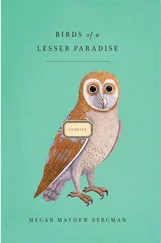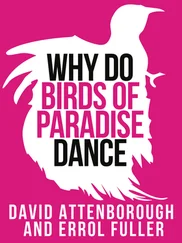Avis had wished desperately at that moment that she’d grown up with a proper mother — a real one — who would’ve shown her what to do — not the shadow figure, muttering over books and papers, two pencils tucked into her hair. Avis’s mother had raised her in a state of benign neglect, and would scarcely have noticed if Avis had stayed out all night for a week or a month. After the police had taken their statements, the officers left and Felice followed her parents back into the house. Avis had closed the front door, and Brian grabbed Felice by one of her winglike arms and swatted her, hard, twice with the flat of his palm against the seat of her jeans.
Avis gulped a high, startled suck of air, and watched her daughter’s face broaden, as if she were about to burst into tears, and then tighten, masklike, into something unfamiliar. Avis didn’t blame Brian exactly — or at least not in the way he assumed she did — not for the spanking. It seemed possible in fact, at times like that, that she really did still love him. She blamed him only for making it so plain to all of them — the gesture so furious and despairing — how ineffectual they were. Felice had started leaving them already: neither one knew how to stop it, neither knew why it was happening.
AVIS LOOKS PAST the waiter’s shoulder. About to surrender the table, she takes a last look at the crowded sidewalk. In that moment, taking in the flux of hair and eyes and talking, the hands and dresses, all at once, a rush of pure, incandescent relief. It floods her body, melting away her bones. There: emerging from the crowd, that brisk, unmistakable, long-boned walk, tall and slim, the fingers curling absently against her sides.
Avis releases the cookie tin and places her hand on the iron chair arms, letting her breath deepen, pushing up, uncurling from her tight hunch. At last. Another electrical cascade of release as she moves forward. At the same moment, the waiter appears, interposing himself between Felice and Avis. “Know what you want yet?”
She flinches. For a moment, the day seems to tilt: Avis sees green and silver leaves, a lace of cirrus clouds, a bit of linen-colored umbrella. Her breath and pulse knock in her cranium. Avis lifts her arms, moving toward the girl, but Felice looks so shocked that Avis halts midway, her arms frozen in the air. The girl’s eyes are wide; whites show around the irises — Avis sucks in a tiny sip of air, trying to smile, because (of course!) it seems that this is not Felice after all, but just another lovely wraith of a girl, a stranger minding her own business. Avis’s lips tremble as she smiles; she says, “Oh, I just — I beg your pardon. I thought you were my daughter… I’m so — I’m—” But the girl turns her body in a smooth, evasive manuever, flipping her hair through her fingers, reentering the procession of shoppers.
Avis watches her go: blood rushes to her face, stinging as if she’d been slapped. She snaps, “You aren’t even that pretty.”
Two bronzed women, dark, sprayed hair piled on their heads, look up as Avis sinks back to her table. She notices the waiter watching her from several tables away, and returns his stare until he looks away.
AVIS HAD AN IDEA of how things were going to be, of her and her daughter, their fingers in a pâte sucrée, rolling, cutting out the shapes of cupids and sea horses and dragons. But Felice was uninterested. The blithe girl ran around the house, light-spirited as a firefly, calling her friends, lying out by the pool, or playing video games. It was Stanley who came into the kitchen to help Avis shell walnuts and separate eggs.
Her own mother had openly disapproved when Avis had announced that, instead of college, she wanted to attend the culinary institute to become a pastry chef.
“That’s a girls’ slum,” Geraldine had said. “All that sugar and decoration. Just a blue-collar job with a frilly apron. You’ll never get half the respect or the pay of a real chef. If you can’t be bothered with an education, at least learn to cook .”
Years later, Avis sat on the couch, her own daughter’s head in her lap, hair spilling like ink over her leg. They’d had a daylong immersion in shopping at the mall in Pinecrest, then tea cakes (crude, coarsely frosted) at the French-Cuban bakery on the Miracle Mile. Avis combed Felice’s hair with her fingers, murmuring, “Who’s my beautiful girl?”
Felice smiled at her mother, barely shifting her attention from the TV cartoons.
Stanley emerged from the kitchen; his arms like twigs in the oversized oven mitts. At twelve, his hair was glossy, his small face pale with thought. Oh, Avis loved him too, but she’d had other plans for her son: she tried to direct his attention toward his father — a lawyer —she murmured the word to him like an incantation. But Stanley persisted in the kitchen, performing the small yet demanding apprentice’s tasks she set for him — removing the skin from piles of almonds, grating snowy hills of lemon zest, the nightly sweeping of the kitchen floor and sponging of metal shelves. He didn’t seem to mind: every day after school, he’d lean over the counter, watching her experiment with combinations — shifting flavors like the beads in a kaleidoscope — burnt sugar, hibiscus, rum, espresso, pear: dessert as a metaphor for something unresolvable. It was nothing like the slapdashery of cooking. Baking, to Avis, was no less precise than chemistry: an exquisite transfiguration. Every night, she lingered in the kitchen, analyzing her work, jotting notes, describing the way ingredients nestled: a slim layer of black chocolate hidden at the bottom of a praline tart, the essence of lavender stirred into a bowl of preserved wild blueberries. Stanley listened to his mother think out loud: he asked her questions and made suggestions — like mounding lemon meringue between layers of crisp pecan wafers — such a success that her corporate customers ordered it for banquets and company retreats.
On the day Avis is thinking of, she sat in the den where they watched TV, letting her hand swim over the silk of her daughter’s hair, imagining a dessert pistou of blackberry, crème fraîche, and nutmeg, in which floated tiny vanilla croutons. Felice was her audience, Avis’s picky eater — difficult to please. Her “favorites” changed capriciously and at times, it seemed, deliberately, so that after Avis set out what once had been, in Felice’s words, “the best ever”—say, a miniature roulade Pavlova with billows of cream and fresh kumquat — Felice would announce that she was now “tired” of kumquats.
Felice sat up as Stanley approached. Avis had noted that Felice was always pleased to eat whatever her big brother offered. Stanley wasn’t looking at Felice, though, but at Avis. “It’s a castagnaccio —I found some stuff about it online. And I tried a few things…” His voice tapered off modestly. He held out a plate with a low, suede-gold cake. Avis had struggled to conjure up a lighter chestnut cake: she realized that — while they’d been shopping — Stanley had reconfigured the laborious recipe. She cut a sliver for Felice and herself and they ate with their fingers while Stanley watched.
The cake had a delicate, nearly vaporous texture that released a startling flavor. There was something, some ingredient, that tugged at the chestnut and lemon and opened the taste on her tongue — the chimera, as Avis thought of it — the secret in the maze of ingredients.
“Mmmm, Stanley — so good.” Felice was already cutting another piece.
Avis took another bite as Stanley waited. She could barely grasp her own response, the plummeting sensation that seemed to plunge through her. Why couldn’t the boy stay out of her kitchen? She wanted him to be more than a food worker. He didn’t realize what punishing work it could be — hot, monotonous, hazardous: it was true manual labor, but magazines and TV dressed it up in glamour. She wanted him to use his mind, not his back. “What is it?” she asked quietly. “A savory herb. Basil?”
Читать дальше












